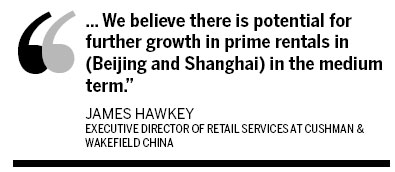Demand for luxury goods driving real estate market
Updated: 2012-07-13 07:39
By Wu Yiyao in Shanghai (China Daily)
|
||||||||
Aggressive expansion by luxury and fast-fashion brands in China is driving the country's retail property investment market, according to the latest report released on Thursday.
A report by Cushman & Wakefield, the privately held commercial real estate services company, said rapid growth in the second half in consumer expenditure and surging enthusiasm for luxury brands, are pushing up demand for retail property, especially in Beijing and Shanghai.
Citing a recent survey by Bain & Co, which pointed out that luxury sales in China had experienced 25 percent growth in 2011, the Cushman report said luxury consumption in China shows no sign of slowing down, with the country now the world's third-largest luxury market.
The result is rising rents and limited supply of top retail space in key city center locations, said the report.
A typical example of the type of luxury name vying for the prime spots is Italian style icon Gucci. The number of Gucci stores in the Chinese mainland has increased from four in 2004 to 46 in 2011 and continues to grow in 2012, the report said.
The Chinese market accounted for 22.6 percent of Gucci's total revenue last year and its year-on-year growth reached 15 percent in the first quarter of 2012.
In the first half, transaction volumes within the overall luxury sector in Shanghai reached $2.52 billion, of which retail property transactions reached $110 million, accounting for 4.2 percent of the city's total retail transactions.
Shanghai's five key retail areas all saw increasing rents in prime retail space.
Representing a 1.03 percent quarter-on-quarter growth, average monthly retail property rentals climbed to 1,904 yuan ($299) per square meter.
Nanjing West Road saw average monthly rentals hit 2,100 yuan per square meter in the second quarter, the highest among the five key areas.
Overall market vacancy rates in Shanghai remained almost unchanged at just 6 percent.
Shanghai, Guangzhou, Shenzhen, Beijing, Suzhou, Nanjing, Hangzhou, Tianjin and Wuhan are regarded as the most attractive cities among retail realty investors, with vacancy rates of current retail property all below 7 percent, the report said.
Retailers are also taking up office buildings as they find a growing need for decent space for administration.
In Shanghai, about 29 percent of prime offices have been leased to international retailers, the report added.
"We are seeing strong competition from retailers for prime sites in both Beijing and Shanghai. While high levels of new supply will keep overall rental growth in check, we believe there is potential for further growth in prime rentals in both cities in the medium term," said James Hawkey, executive director of retail services for Cushman & Wakefield China.
Fast-fashion brands are also expanding rapidly, especially in second- and third-tier cities.
Established names such as Zara and H&M opened more than 20 stores in 2011, while Uniqlo had more than 120 stores in the Chinese mainland by the first half of 2012, the report said.
The number of fast-fashion stores in 45 cities across China in the first quarter of 2012 saw a 9.5 percent quarter-to-quarter increase, the report said.
Retail investment in China has also been growing aggressively during the past two years.
In 2011, China's retail investment volume reached 46.9 billion yuan in 2011, double the amount of 2010, according to the report.
With ongoing real estate curbs, developers are facing increasing pressure on financing, said Jack Ye, Cushman's national director of capital markets in China.
With interest rates dropping, domestic investment will become more active, said Ye.
Zhang Ping, the company's director of research, meanwhile, added that investing in China's retail real estate is inevitably risky, especially for institutional investors, but in the long run, retail realty investment presents growth potential.
The company noted that increased investment in the sector by individuals, as the residential sector has cooled.
wuyiyao@chinadaily.com.cn

(China Daily 07/13/2012 page16)

 Relief reaches isolated village
Relief reaches isolated village
 Rainfall poses new threats to quake-hit region
Rainfall poses new threats to quake-hit region
 Funerals begin for Boston bombing victims
Funerals begin for Boston bombing victims
 Quake takeaway from China's Air Force
Quake takeaway from China's Air Force
 Obama celebrates young inventors at science fair
Obama celebrates young inventors at science fair
 Earth Day marked around the world
Earth Day marked around the world
 Volunteer team helping students find sense of normalcy
Volunteer team helping students find sense of normalcy
 Ethnic groups quick to join rescue efforts
Ethnic groups quick to join rescue efforts
Most Viewed
Editor's Picks

|

|

|

|

|

|
Today's Top News
Health new priority for quake zone
Xi meets US top military officer
Japan's boats driven out of Diaoyu
China mulls online shopping legislation
Bird flu death toll rises to 22
Putin appoints new ambassador to China
Japanese ships blocked from Diaoyu Islands
Inspired by Guan, more Chinese pick up golf
US Weekly

|

|






